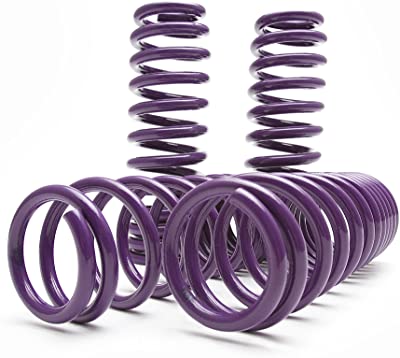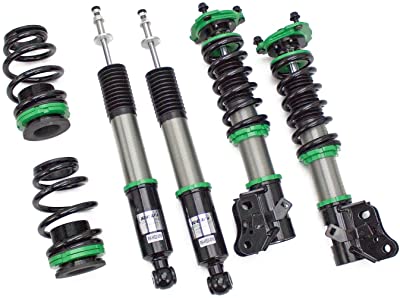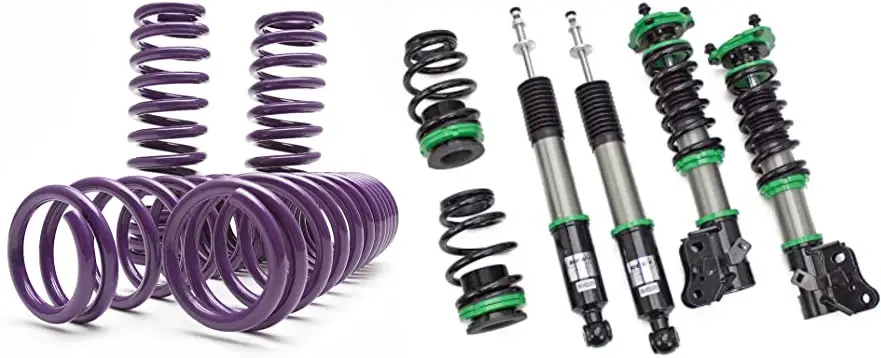Coilovers are a great choice for drivers who want to lower their vehicle and still get the feel of riding smoothly. While lowering springs doesn’t necessarily lead to poor ride quality, if you’re looking for an even better driving experience then Coilover suspension might be right up your alley.
The aftermarket suspension market is full of options for every budget and intention. While there’s no universal right or wrong, what works best will depend on how much you’re willing to spend as well as your car-related goals with the vehicle. Which system is right for you? This can be tough to decide between lowering springs vs. coilovers, but we have put together a short article with the pros and cons of each.
What are lowering Springs?

Lowering springs are the perfect solution for cars that have been lowered too far. Lowering your car using smaller, more rigid steel coils with marginally higher rates of tension will bring it back up to proper height without sacrificing performance or ride quality. Lowering spring systems are great for people who want their car lower without any regard for changes in dampening and will work well on track or autocross events where the goal is simply not smooth rides but rather stiffer ones that provide more grip.
What are Coilovers?

Coilovers are a great option for those who want to customize their ride height without lowering springs. Coilovers give you the ability to change your ride height and spring rate individually, which is essential for those who enjoy tuning their car. Some even allow adjustability in damping rates depending on what’s needed at high speeds or low-speed turns – perfect if there are preferences between stiffer handling while cruising versus softer suspension when cornering hard.
Lowering Springs vs. Coilovers
Adjustability
Lowering springs is a simple and easy way to change your car’s ride height. Unlike coil-overs, they do not come with any adjustable parts which means you can’t increase or decrease how high up on the road locally after installation- so make sure that this is what you want before buying.
Simplicity
lowering springs are simple to install. There’s no need for any additional configurations and they’re perfect if you don’t race regularly or want a more mellow ride height – but still enjoy some good handling on your car.
Price
If you’re tight on budget and want to lower your car, please pick high-end lowering springs instead of coilovers. You don’t want the problems that come with it. You might end up with problems if it’s not high enough quality and the cheaper ones can be unevenly installed which will lead to even more issues downrange.
Comfort
Coilovers are a great way to improve handling on your car, but they sacrifice comfort. If you want more performance without any trade-offs then look into lowering springs which will lower both the height of how high off-ground a vehicle sits as well as modify its trajectory when traveling at speed – this is usually enough for public roads where most people drive around town with their daily drivers anyways.
Handling Improvement
Coilover comes with everything needed to get an awesome handling compound, including springs and shocks. When you buy one of these kits there’s no need for any additional installation or wiring they’re complete installations right out of the box. This means less time spent troubleshooting why your ride is acting funny on turns because all those hard parts work together smoothly without having too many other issues plaguing them at once.
High Accuracy
Lowering springs can be difficult to use and don’t allow you enough room for error. Coilovers, on the other hand, allow adjustments so that your ride is always perfect without having an Accurate height. This could be important if performance users know what they need from their cars.
Pros and Cons of Lowering Springs
Pros
- More road feel
- Stiffer ride
- Less roll when concerning
- Better handling
- Improved aerodynamics
- Improved traction
- Great looks
Cons
- Reduced ride comfort
- Impractical for rough roads
- Potential rubbing on parts or tires
Pros and Cons of Coilover
Pros
- Much improved handling
- More aggressive looks
- Adjustable
- Interchangeable components
Cons
- Scraping the ground
- Stiff drive
- Can be expensive
FAQ
Are daily coilovers or lowering springs better for driving?
Coilovers are a great way to improve handling on your car, but they may not be the best if you want something that’s comfortable for long journeys. Instead, look into lowering springs which will let you lower your vehicle while still providing improved traction.
Are coilovers smoother than lowering springs?
Coilovers are a great way to get more street-legal performance from your car. They typically offer even stiffer spring rates than lowering springs, sacrificing ride quality for cornering ability which is why they’re popular with racers who need excellent handling.
Should I Install Coilovers or Lowering Springs?
Coilovers If you’re looking for an instant handling improvement, coilovers are the way to go. They offer great performance and excellent customization options that can’t be found anywhere else. Lowering Spring- A lowering spring will give your car a more elegant driving experience by reducing dive during hard cornering or acceleration while also making it easier on tires at high speeds because they’re less likely to over-compress when going into corners without this extra safety feature installed in them already.
Final Words
In order to get the most out of your car, you need a good suspension system. Standards change depending on what kind and how much money one can spend- but regardless there’s always an option for everyone
Lowering your car can be a cheap and easy way to give it an improved stance, but this might not always work out the best for handling. Coilovers are better as they allow you plenty of adjustability while still giving great results when driving around town or at speed on mountain roads.
There are a lot of options when it comes to modifying your car’s suspension and this can be overwhelming. You have different choices depending on what you plan on using the vehicle for as well as how much money is available, so make sure that any purchase meets both requirements before buying anything else.
See also:
- KYB Excel G Vs OEM Shock Absorber: Differences With Table
- Detroit Axle vs. Monroe Struts: A Real Comparison (Table)
- FCS Vs Gabriel Struts- Main Differences
- Sensen Shocks vs. Bilstein: Which Is Best For You?
- Monroe Roadmatic vs. Quick Strut: Which Is Best?
- Monroe Reflex Vs Gas-Magnum: Comparison (With Table)
- Kyb vs. Monroe Shocks: A Real Comparison

